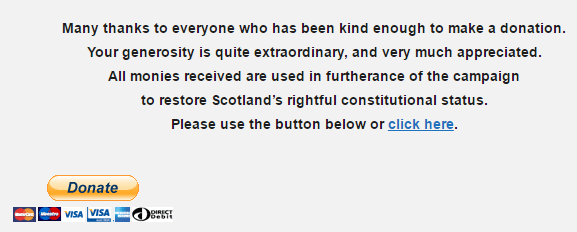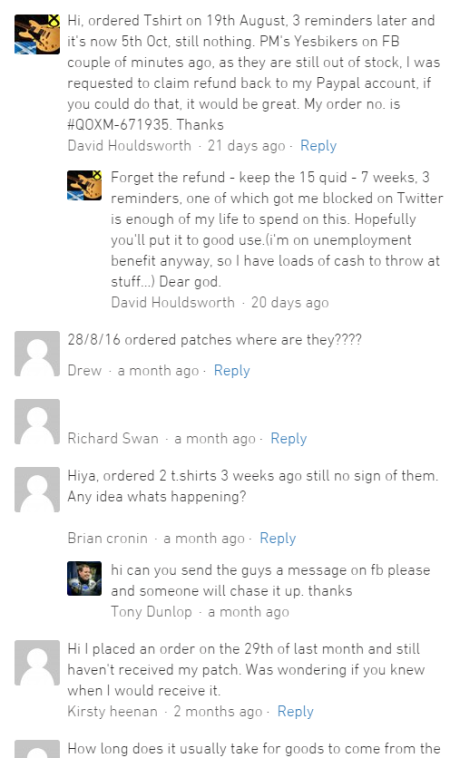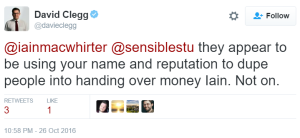I ended Part 1 of this two-part post about nationalist online fundraisers – the law and good practice – with six questions I said I’d ‘want answered before I donate money online’:
- Can I see explained clearly which person, group or organisation is raising funds and why?
- Do they tell me how my donation will be used?
- Does the fundraiser show me they can be trusted, and how?
- Is it obvious how to make a donation?
- Does the site show donations to date?
- Does it set out how else I can help, if at all?
Thinking about my words, I’d probably recast the answers to these six questions as the ideal, the Rolls Royce if you like, of online fundraising. There are circumstances in which I would have (and have) donated money online, in my case charitable causes, without confirming answers to all those questions.
That’s because I believe the question of trust looms disproportionately large in the decisions donors are likely to make. That’s not to say the trust might not be mis-placed. But if, for example, you know that your near neighbour of long-standing is collecting online for a family that you also know whose house has been flooded, you might weigh that knowledge more in the balance than, say, that of an anonymous stranger in Azerbaijan doing the same for a village you’ve never heard of.
Two preliminary points about what follows.
- If you trust any person, group or organisation raising funds online, then fine, discount any of the negative points I make.
- I infer no wrongdoing by any of the examples of online fundraising discussed here.
I previously described the examples I’d use as a ‘not-quite-random sample.’ By that I mean I’ve chosen a few to look at because they are large and/or well-known and a few because they’ve come to my attention for other reasons. I suspect that they are the tip of a large iceberg but I don’t pretend that they’re typical or tell you anything about any other online fundraisers.
I link each example to the online site(s) or page(s) I refer to. As with Part 1 the links are not there to interrupt your flow of reading but so my statements can be evidenced if you wish. My examination of each does not address all six questions above. I pick out features of the particular example that I think might be of interest. If you want to make a wider judgement about any of them I’d urge you to look at the relevant website/page and think about how, if at all, it answers the six questions.
First, since I said in Part 1 ‘I may find good practice to praise,’ let me start with a site that seems to me as good as it gets in terms of soliciting donations from readers – Common Weal. You’ll realise, by the way, that I’m talking about its fundraising not its substantive content: this one happens to have plenty of interesting material but, like all my examples, I disagree with its fundamental aspiration – separation.
The very first words on the Common Weal home page ask ‘What is Common Weal?’ and take you straight to a page that explains – ‘a think tank, a campaigning and advocacy organisation … ’ Here you’ll see the clear statement that it is a non-profit company and further links to its constitution and articles and a list of board members. You can check the details of Common Weal Ltd (company number SC483485) on the Companies House website. There you can find its first year’s accounts, ‘abbreviated [and] unaudited’ because it is a small company. They may not be typical because it was the company’s first year. My only quibble, and it is little more than that, is that I could not find the company number on its website, a statutory requirement (see Part 1 of these two articles).
Donating to Common Weal could not be clearer. There’s a link from the home page to a Donate page which not only sets out four ways donations can be made but also explains ‘What we will do with your money.’
This is, almost, a gold standard. I’d still say don’t give them money, because I don’t agree with their aims, but that’s a different issue.
It seems natural at this point to turn to another large nationalist website, perhaps the largest – Wings over Scotland. To give Stuart Campbell who runs the site his due, he does spell out on his Donate page how he has raised £435,000 in seven separate appeals since 2013, although not all this total was raised online. Some of his fundraisers were for specific projects. Like all the websites covered in this post he also has an open invitation for readers to donate, in this case via PayPal or by direct bank transfer to an account ‘in name of Stuart Campbell.’ The introduction to the page says ‘How to support Wings Over Scotland and other Yes causes,’ although which other ‘Yes’ causes donations might support is not clear.
On his home page you’ll find a link to his most recent fundraiser in April 2016 where you can see further details of how he intended to spend at least some of the money he raised this year, including a ‘modest editor’s salary’ of just under £23,000 per year (little enough to live on in expensive Bath, where Campbell is based, but he may of course have other sources of income). You’ll also find a link to the Wings’ ‘Megastore’ where you can buy a range of branded goods all priced, curiously, in US dollars: questions and phone orders are directed to a US landline number.
All the circumstances of the Wings website suggest that this is, at least in lay terms, a business, albeit one with a specific political purpose. What is not clear is its business structure. I can’t find any evidence that it’s run as a limited company. It may be a partnership (but if so of whom?). Or it may be owned by Stuart Campbell as a sole trader, which the bank account details ‘in name of Stuart Campbell’ on the site suggest it probably is. Given its substantial income and activity donors might be interested in knowing which it is. Of course, only limited company status would give access, through published accounts, to a financial overview of what is a substantial operation.
(Wings also appears later in this post under the name of another appeal for funding)
While Wings is a major online fundraiser, other nationalist websites are more modest in their aim.
Here’s a site with the immodest title of Politics Scotland that in fact is a lot less than its name suggests, containing not much more than a scattering of undated posts about a few aspects of politics from a nationalist perspective. The home page (linked above) contains the exhortation ‘Contact us today!’ although there is no link that allows readers to do so. Still, the anonymous owner (who also tweets as @PoliticsScot) is not backward in coming forward to solicit donations so he can leave his job and run this website full time:
His PayPal page [15/2/2018 e-mail address removed at his request although it was in the public domain] even offers the option of making a monthly payment. There is no news as to whether his fundraising has been successful.
Other individuals, not always anonymous, make multiple attempts to raise funds online. SNP activist Peter Bell, who has been mentioned in a few posts on this blog is one such. At the moment he seems to be involved in two sites that solicit funds.
First, indyref2 which he runs with Mark McNaught, academic at the university of Rennes, and G A P Ponsonby, long-time fan of the BBC. It is ‘explicitly pro-independence [and aims] to be a credible, authoritative, interesting and entertaining source of news, analysis and commentary relating to Scotland’s political scene.’
This is a curious one. Not because of the authors’ aim but because they break what is surely the cardinal rule from a fundraiser’s point of view – making it easy to donate. Neither the home page, contact page nor ‘About us’ page mention donations. Requests for money come only at the end of articles and then only (for the sample I checked) for Messrs Bell and Ponsonby. Moreover the terms of the solicitation are different, and donations go to what seem to be different personal PayPal accounts. Thus, Peter Bell, in these terms:
which clicks through to this:
and G A Ponsonby like this:
or this (note that any donations here seem destined to fund a new laptop for Mr Ponsonby):
which clicks through to this:
The second site Peter Bell is involved with, also with Mark McNaught as a ’co-director’, is called Demos Scotland and aims to help formulate a constitution for a separate Scotland. Here the request is to Join us, in the one level of ‘membership’ available, although it is not clear what the ‘membership’ is of. Again you’ll see the reliance on PayPal:
The name Demos sounded familiar and when I saw the site I wondered if it was linked to the well-established UK think tank Demos. The answer is no according to a Demos representative:
On a historical note, Peter Bell was also involved with now-SNP MP Chris Law’s c. 2014 project The Spirit of Independence. The second of two fundraisers for it set out full details of what was involved. If you click on ‘About’ under Chris Law’s photo you will see Mr Bell was part of the team: (Further team members follow in that list)
(Further team members follow in that list)
The project has recently been the subject of Police Scotland interest.
A rather different outfit, Yes Bikers, say they are a group that attend pro-independence rallies and aim ‘to share content which holds the truth and helps No Voters understand the overwhelming positives that the Yes movement has at its core.’ They have conducted two fundraisers on the Crowdfunder website, one related to an annual dinner, one to a festival to be held in 2017. They also have a shop accessed through their Facebook page. When I clicked to look at it my internet security advised me not to visit as the connection was not private. It is presumably this shop that has given rise to a number of comments on their website:
I could not find any information on the web about the group’s structure.
The Brain family, an Australian family in the Highlands whose attempt to stay in the UK was taken up by the SNP (see previous posts on this blog – just search for ‘Brain’) have also been the subject of at least three online fundraisers on their behalf this year:
- for £3,000 to top up their bank account (£75 raised online), sponsored by a Margaret McNeil
- for £5,000 to help fund their further visa applications and living expenses (£8,250 raised), sponsored by ‘the Macartney family’, and
- ongoing as I write, for £36,000 to ‘assist the Brain family; driven into debt by the callous UK Home Office in trying to stay in Scotland’ (£4,065 raised as of today), sponsored by A McCandless.
It is not clear from the fundraising pages who the Macartney family and A McCandless are. Thanks only to a comment by Mrs Brain it’s possible to work out that Margaret McNeil is a friend or neighbour.
I mentioned earlier that Wings would feature in another example of online fundraising, one which introduces amongst other ideas the novel concept of what I’d call pyramid fundraising. This is the ‘not-for-profit’ AyeMail ‘committed to help pro-indy organisations and individuals with their crowdfunding and merchandise delivery.’ They provide a range of services and sell items online under eleven different headings listed on their website (top right of their pages). So, for example, under ‘Wings’ you’ll find Wings-branded badges, stickers, posters, hoodies and a flag. Under the headings Green, RISE, Show Specials, SNP, and SP16 you’ll find empty pages and the legend ‘No results found.’ It’s not clear whether this means they have no current contracts for these organisations/subjects or whether selling their branded goods is only an aspiration. With the exception of a couple of pro-EU-items, everything else sold is in fact Wings-related.
This however is not the reason I’ve chosen AyeMail as a fundraising example. It’s because they also have their own current online fundraiser, not the first, Going Postal. Their target is £11,845 of which, as I write, they’ve raised £4,775. £3,500 of the target is for themselves:
What we need most is free time, which means no day job getting in the way. So once again we’re looking for just enough to pay the mortgage and the bills over the next six months … Secondly, we’ve outgrown our small office … [W]e have some extra space available to us, but it needs storage and shelving as well as electrical work.
They’re also collecting money for other projects/products – postcards, badges, window stickers, a series of documentaries – and ‘Friends of Wings.’ This latter, they say, is an unofficial stall staffed by ‘dedicated Wings readers’ over which Wings has no input or control that has ‘raised a huge amount of money [but no idea is given of how huge] for good causes around Scotland as well as spreading the message to voters on the ground.’ The fundraiser includes ‘a budget to produce their own materials as well as distribute ours and anything that comes out of Wings.’
AyeMail seems to be run, although on the evidence available you can only say ‘seems,’ by someone called Lindsay Bruce, who also tweets as @RogueCoder250 (he says on his Twitter profile that he founded AyeMail).
Tracing the detail of online Wings-related fundraising and products for sale shows how convoluted the relationships between cause, brand, brand owner, wholesaler, retailer, volunteer seller and fundraising can be. Of course, there’s nothing inherently wrong with these relationships and they match much of what you find in the world of commerce. But it does exemplify how difficult it can be to find out who’s responsible for what on the web where money’s concerned.
I had intended AyeMail to complete my list of examples of online fundraising for nationalist-related causes. But as I began to draft this post I became aware of a new website called informScotland that some nationalists themselves are concerned about. Like so many, it also seeks donations via PayPal. Quite who is involved with informScotland is unclear from their site but it contains articles by well known nationalist authors. Not all (any?) however seem to have been informed, let alone asked, about their material appearing on the site. Daily Record journalist Davie Clegg raises the issue:
and Iain Macwhirter, cited by Clegg and whose writing seems to have been ‘liberated’ by informScotland, comments:
This final case seems to have no relationship with any of the other examples of nationalist online fundraising. It does however illustrate starkly the legal principle of Caveat emptor, let the buyer beware. If you are buying anything online, and that includes affiliation to a cause you believe in, do take care. That way you know you’ll be donating to what you regard as the good rather than the bad … let alone the ugly.












A lot of wok for nothing. People know why they donate. I guess you are just angry about it.
LikeLike
Do you really think you saw anger in all that? I do wonder if donors to some of these fundraisers would be angry if they knew how unaccounted-for their hard-earned cash might be.
LikeLiked by 1 person
Must say I would not describe Wings Over Scotland as a “nationalist” site. It supports independence yes.
LikeLike
Thanks for your comment. I tend to use nationalist and separatist as words for people in Scotland who want to break from the UK. I know many don’t like that but they in turn use words I’m not comfortable with. We all use language to suit our own purposes and I think we have to live with that (BTW I’m not referring to the abusive nonsense uttered by supporters of both sides and none)
LikeLiked by 1 person
CafePress (home of the Wangs Over Scotland Megastore) only defaults to dollars, because it’s a US site. If you click on the flag at the corner you can get all prices in Sterling.
LikeLike
Regular readers will know my only criterion for blocking comments is abuse. This isn’t abusive. But if you waste your time and money on the laughingly named megastore more fool you.
LikeLiked by 1 person
Pingback: Only Angels earn Wings – Separatist Spin Unravelled | Steve Sayers